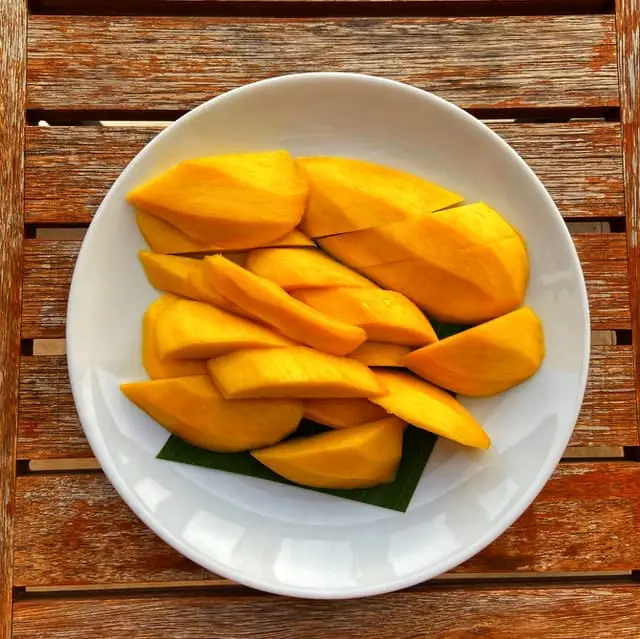
India is considered the birthplace of mango. In India, mango is considered the king of fruits, and not by chance, but due to its unique composition and the combination of nutrients that have a positive effect on the body.
In Asian countries, the tropical fruit is considered a source of vitality, physical activity and good spirits. Mangoes have a delicious taste, very filling and at the same time have a beneficial effect on the skin of the face and body.
How can dogs benefit from eating Mangoes:
Mango contains vitamins, minerals, vital amino acids, among which are those that are not synthesized in the body, and therefore must be supplied with food. Mango contains nutrients like:
- vitamins A, group B (including B1, B2), C, PP;
- trace elements – primarily sodium and potassium, as well as iron, phosphorus, calcium, copper;
- fiber (1.7%).
Due to its rich nutrient content, eating mangoes is beneficial to dogs in the following ways :
- improves immunity;
- restores the nervous system;
- helps to neutralize the negative effects of stress factors on the body;
- normalizes heart function;
- improves the state of the vascular system and hematopoiesis processes;
- prevents the formation of neoplasms.
Mango has a low calorie content (60–70 kcal per 100 g of mango). 85% of the mango pulp consists of water, 1% protein, 0.7% fat and 16.6% carbohydrates.
What are the negatives effects of feeding Mangoes to dogs:
The negative effect of the mango include a large amount of organic acids, which often cause allergic reactions in some dogs.
- Mango should not be fed to dogs in large quantities – this can lead to constipation, exacerbation of diseases of the digestive system. Due to the high percentage of sugars in fruits, it leads to problems related to diabetes.
- Some dogs can be allergic to Mango. Hence feed the mango in small quantity to ensure that your dog is not allergic to it.
- Also Mango increases the overall heat of the body.
- Mango is high in sugar. Hence should be limited for dogs prone to diabetes.
Hence mango should be given to dogs in moderation.
Is it Safe for Dogs to eat Mango?
Yes, mango is safe for dogs to eat. However, it should only be used as a treat, and not included in the daily diet.
Dogs love mango for the sweet taste of the pulp and veterinarians love it for the rich nutritional composition of the product. Vitamin A is necessary for animals to maintain visual acuity, kidney function, B vitamins are involved in almost all processes that occur in the animal’s body,
Eating mango is beneficial to the dog for the following reasons:
- Eating mango contributes to the positive emotional state of the dog;
- It accelerate tissue regeneration;
- It supports the work of the cardiovascular system;
- It normalize the work of the organs of the gastrointestinal tract;
- It improve the condition of the skin and coat.
Vitamin C is the main element that is responsible for immunity, supports the growth of teeth and bones, cartilage, connective tissues. It accelerates the removal of inflammatory processes in the body. Vitamin E supports reproductive functions, accelerates the elimination of toxins from the body.
Ripe mango contain more B vitamins and carotene (vitamin A), unripe mango contain more ascorbic acid (vitamin C).
The trace elements contained in the fruits are necessary to maintain normal systems of the dog’s body. Potassium contributes to the proper functioning of the muscular and nervous systems, calcium is necessary for strengthening and growing bones, improving hair, magnesium maintains energy at the cellular level, sodium is involved in metabolic processes.
Mango contains pectins (soluble fiber), which contribute to the elimination of radionuclides, heavy metal salts.
Symptoms of Allergic Reaction that a dog can get by eating Mangoes:
- vomiting;
- diarrhea or, conversely, constipation;
- bloating;
- dyspepsia;
- rashes on the skin;
- peeling;
- lacrimation;
- nasal discharge, sneezing;
- redness of the eyes, nose, tips of the paws;
- breathing disorder;
- hair loss;
- swelling of the face;
- itching.
An allergic reaction may occur even if the dog tastes mango for the first time. In case of a hypersensitive reaction, you should avoid mango from the dog’s diet and consult a veterinarian.
How much Mango can you feed a dog?
Mango contains a lot of sugars, so do not give your dog too much mango; especially for those dogs that are prone to rapid weight gain or have diabetes. For dogs with diabetes, mango will always be prohibited.
Mango can increase the body heat. Also some dogs can be allergic to Mangoes.
Pets should be given mango, observing the following rules:
- the total calorie intake of mango should not exceed 1/10 of the daily food volume (in terms of calories, not grams);
- you can give the mango in small pieces as a treat, or mix it with cereals, vegetable stews.
Veterinarians do not restrict the feeding of mango to pets, except for obesity or diabetes mellitus.
How to prepare a Mango to feed your dog:
- Peel the Mango
- Remove the seed
- Cut the mango into small pieces
Its safe for the dogs to eat small pieces of mango.
Do not feed your dog Mango skin or Mango seed. Mango seed creates choking hazard to the dog. Also it contains traces of cyanide which can be very dangerous to the dog.
Can Puppies and pregnant dogs eat Mangoes?
Mango can be fed to puppies, pregnant and lactating females dogs. It is best to introduce mango to a dog when it is a puppy.
You can only give the dog the pulp of the fruit, peeled and seeds removed.
When you introduce mango to your dog, always remember that dogs can be allergic to mangoes. Sometimes, not only eating mango, but even touching the skin of the fruit can cause an allergic reaction. If you notice something strange in the pet’s behavior or any of the listed allergic symptoms, immediately take the dog to the veterinary clinic.
Important!
Only ripe fruits can be given to animals. Unripe fruits (having a greenish tint) can cause intestinal upset and colic.
If Dog does not link Mango, which Tropical Fruit can be fed to Dog:
If your dog doesn’t ask for a mango, or if you doubt the safety of feeding tropical fruits, you should pay attention to the more familiar fruits and berries. Apples contain a whole range of nutrients, vitamins, and they are safe for pets. It is desirable to give preference to green varieties.
Melons and watermelons, pears are not prohibited for dogs, and from exotic fruits you can give bananas containing a lot of potassium, peaches without skin, oranges, papayas. In any case, when introducing a new product into the pet’s diet (even as a treat), you should consult your veterinarian.
Can Dogs eat Dried Mango.
Yes, its safe to feed the dog dried mango.
Can Dogs eat raw mango ?
Yes, its safe to feed the dog dried mango.
Can dogs eat Mango Icecream or Mango Popsicle?
Ice-cream should not be a regular part of dog’s diet. However, occasionally you can feed the dog mango ice-cream or mango popsicle as a treat.
Can dogs eat Mango seed or Mango pit?
No, it is not safe for dogs to eat Mango seed. Mango seed creates choking hazard to the dog. Also it contains traces of cyanide which can be very dangerous to the dog. Hence, do not feed mango seed to the dog.
Can dogs eat Mango Peel?
Mango peel does not cause any immediate problem for the dog. But it can be difficult for the dog to digest. Hence it is recommended to not feed mango peel to the dog.






